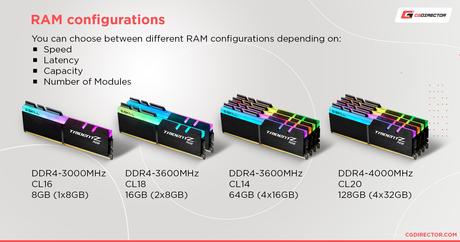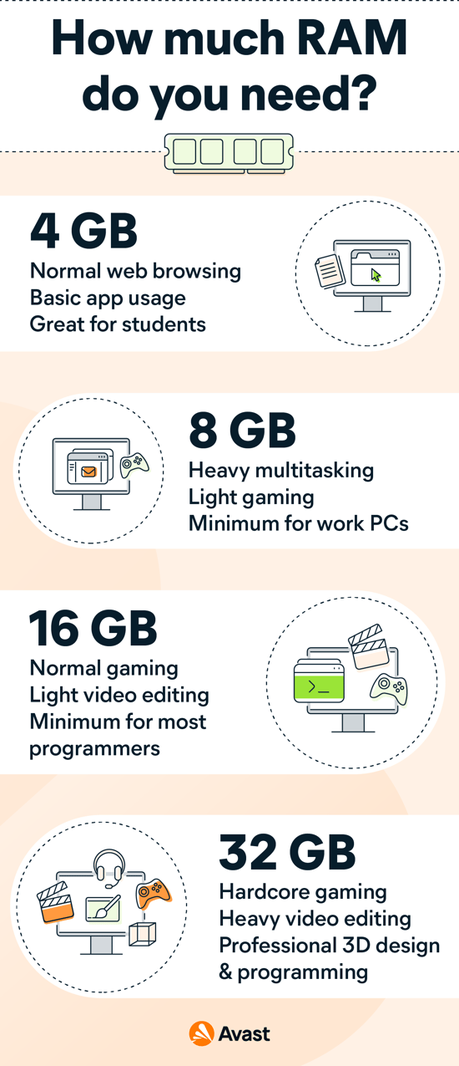Random Access Memory (RAM) is an essential component of any computing device. Whether you are a casual user, a professional, or a gaming enthusiast, determining the right amount of RAM for your needs can be a critical decision. In this article, we will explore the factors that influence the amount of RAM needed and provide guidance on making the best choice for your specific requirements.
Understanding the Role of RAM
RAM plays a crucial role in the performance of your computer. It serves as temporary storage for data that the processor needs to access quickly. When you open an application or load a file, the data is transferred from the hard drive to the RAM for faster access. The amount of RAM in your system directly impacts its ability to handle multiple tasks simultaneously and run resource-intensive software efficiently.

Credit: www.cgdirector.com

Credit: www.avast.com
Factors Influencing RAM Requirements
The amount of RAM you need depends on several factors, including:
- Usage: Determine how you plan to use your computer. Basic tasks like web browsing, word processing, and email generally require less RAM compared to demanding tasks such as video editing, 3D rendering, or gaming.
- Operating System: Different operating systems have varying RAM requirements. For example, while a basic installation of a lightweight Linux distribution may run efficiently with just 1GB of RAM, a modern version of Windows or macOS typically benefits from having at least 8GB of RAM for smooth performance.
- Software Requirements: Consider the RAM specifications of the specific software applications you intend to use. Some professional software, including design and simulation tools, may recommend higher RAM capacities for optimal performance.
Recommended RAM Capacities
Based on the factors above, here are some general recommendations for different usage scenarios:
Usage Recommended RAM Capacity
Basic Use (Web browsing, Email, Word Processing) 4GB – 8GB
Professional Use (Design, Engineering, Video Editing) 16GB – 32GB
Gaming & Multimedia 16GB – 32GB
Assessing Your Current RAM Needs
If you are unsure about your current RAM usage, you can check the memory usage of your system using built-in tools available in your operating system or third-party applications. Understanding your typical RAM usage will help you determine whether your system may benefit from a RAM upgrade.
Frequently Asked Questions For How Much Ram Is Enough?
Is 32 Gb Ram Overkill?
32 GB RAM may be more than what most users need. It is considered overkill for everyday tasks like web browsing or office work. However, it can be beneficial for resource-intensive tasks like video editing or gaming. Assess your specific needs before deciding on the appropriate amount of RAM for your system.
Is 16 Gb Ram Enough For Normal Use?
Yes, 16 GB RAM is more than enough for normal use. It provides sufficient memory for multitasking, running multiple applications simultaneously, and browsing the internet without any lag or slowdown. With 16 GB RAM, you can also indulge in light gaming and editing tasks comfortably.
Upgrade to 16 GB for a seamless user experience.
Who Needs 32gb Ram?
Individuals involved in heavy video editing, 3D rendering, or running multiple virtual machines benefit from 32GB RAM.
How Many Gb Of Ram Do I Really Need?
You’ll need at least 8GB of RAM for basic tasks, 16GB for multitasking and gaming, and 32GB or more for professional workloads.
Conclusion
Ultimately, the question of “How much RAM is enough?” is dependent on your unique usage patterns and performance expectations. Assessing your current and anticipated needs, considering the factors that influence RAM requirements, and staying informed about the recommendations for your specific use case will guide you in making an informed decision about the right amount of RAM for your computer. By choosing the appropriate RAM capacity, you can optimize the performance of your system and enhance your overall computing experience.
For more information and personalized guidance regarding RAM upgrades or system optimization, consult with a reliable computer hardware expert or refer to the resources provided by reputable technology manufacturers such as Kingston, Crucial, and Corsair.
